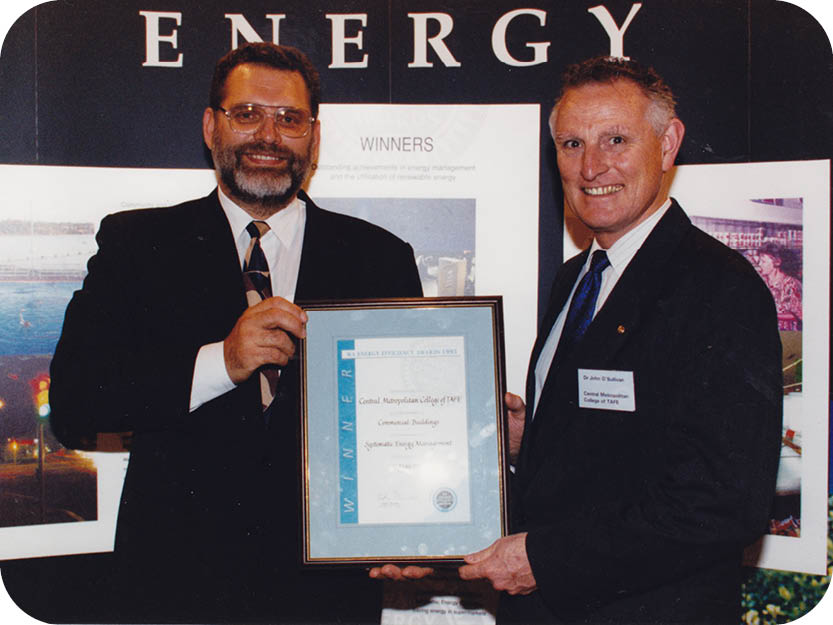
Environmental Sustainability
In my role as Campus Manager and Manager Facilities Development at Central TAFE from the early 1990s through to 2005, I pursued my passion for environmental conservation and sustainability. This was well before today’s sustainability push by government and citizens. It was a struggle because many people at the time thought I was wasting time on this and that it was ‘smoke and mirrors’.
In the early days I received little recognition for the work done; the work was outside my regular duties and although management was aware of what I was doing, they provided little support by way of funding and staffing.
I was permitted to work with a team of equally passionate Central TAFE site-based Facilities Officers to take on waste reduction projects; they too did this work outside their normal workload. We were able to significantly reduce the college’s environmental footprint by modernising air conditioning, building management and lighting controls. All funding for projects was obtained via external grants, totaling in the millions of dollars. We had an excellent relationship with the State Office of Energy WA; they often funded plant enhancements with a view to determining feasibility of across government implementation.
Sustainable Energy Development Office of WA awards
I was a member of a team that development an Energy Conservation Manual for the TAFE sector, this manual was the start of implementation of energy conservation across all colleges in WA.
We turned heads when we started winning environmental awards including:
- Office of Energy – Commercial Buildings Category 1995 and 2001.
- We were finalists in the Keep Australia Beautiful 3R Awards.
- Office of Energy – Energy Achiever Award 2001. In 2001 I was nominated anonymously for and won the state-wide Office of Energy “Energy Achiever of the Year†award. I must admit it was a shock and I was delighted to be recognised by my peers.
All this success was due to dedicated band of workers, who worked behind the scenes using common sense to reduce waste and improve the bottom line. We were doing this before it became fashionable to conserve energy and reduce waste.
Slowly my project gained management recognition and they looked to my team to implement sustainability projects and reporting that was gradually being introduced across WA government. Successes included:
- Reducing overall energy consumption while increasing total ‘student contact hours.’ In 1998 the college used 9,284,000 units of electricity and 2,245,000 units of gas. By 2002 we reduced electricity use to 8,002,000 units and gas to 1,896,000 units. During this period our student contact hours rose from 5,912,000 to 7,471,000.
- Employing a full time Environmental Officer to focus on development and implementation of policy, procedures, conservation and waste reduction strategies. Initially it was very difficult to convince management on the value of this position, thankfully lobbying through external sustainability strategists, our successes in winning awards and the growing requirement for sustainability reporting we were successful.
- Conducting energy and water audits across college sites. Implemented a wide range of technical projects with a focus on energy, water conservation and waste management.
- Secured substantial funds for energy and waste reduction and recycling projects from external sources.
- I was successful in convincing management in going forward with a Facilities Management Contract with an Energy Performance Contract, the first in any in any multi-site govt. agency in WA. The feasibility study projected savings of $1,334,000 over five years.
- I developed a comprehensive printing and photocopier strategy for the college and called tenders based on a full facility managed model where we paid only a price per copy. The feasibility study projected savings of $1.7m over five years.
In 2008 a serious medical condition forced early retirement; thankfully my health has now improved and I am in remission.
My leaving the college resulted in lost opportunities:
- The Facilities Management Contract with an Energy Performance Contract did not proceed.
- The printing and photocopier strategy stalled, all of the new equipment was installed but the reduction in inkjet and fax machine use phase and full electronic document management did not proceed.
- The Environmental Officer’s position was abolished.
It appears I was ahead of my time and without a willing champion to pursue the various projects they died off.
It is however heartening to see that today environmental sustainability is a buzz word, we regularly see advertisements on TV talking about energy and water conservation. Recycling, conservation and waste reduction are daily topics; let’s all do our bit and leave a planet in better shape than our generation found it!
